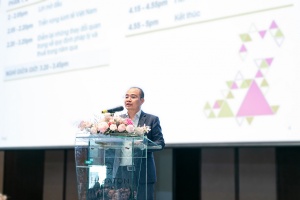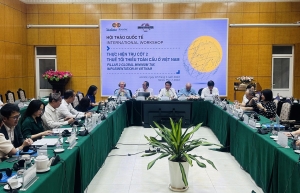Multinationals keen to thrash out global tax arrangements
At last week’s international workshop on implementing Pillar 2 of the global minimum tax (GMT) in Vietnam, Dong Thi Hong Anh, chief accountant of its Vietnam operations, said tech giant Samsung stands ready to pay more taxes in Vietnam in line with the GMT roadmap.
“Samsung has been aware of the GMT since its early days, and is eager to gain insights into the Vietnamese government’s support for businesses in line with its implementation,” she said at the event, hosted by the Vietnam Association of Foreign Invested Enterprises and the Washington-based International Tax and Investment Centre (ITIC).
Samsung Electronics Vietnam – the country’s largest foreign investor – posted revenues of about $75 billion in 2023, accounting for nearly 20 per cent of Vietnam’s export turnover, creating jobs for nearly 200,000 direct workers and millions of indirect workers. It plans to rapidly ramp up investment in IT and semiconductors, and hopes the government to ensure fair and equitable benefits for the company.
At a seminar organised by the National Assembly’s Committee for Finance and Budget, CEO of Samsung Electronics Vietnam said that the company paid 2023 corporate income tax at a 6.9 per cent rate. If the tax rate increases to 15 per cent, it will have to pay an additional $650 million.
The CEO has proposed the government refund it $100 million for technological innovation, $150 million for research and development, and $100 million for matching with Vietnamese businesses. This would be equivalent to half of the top-up tax.
Intel representative Do Thi Thu Huong expressed similar sentiments at last week’s workshop. “As Vietnam is drafting detailed legislation on implementing the GMT and providing support for businesses, Intel looks forward to cooperating with the government on this issue,” she said.
 |
| Multinationals keen to thrash out global tax arrangements, Photo: Le Toan |
In another case, at the end of February, LG Chem is expected to be obliged to pay an additional $112 million to the South Korean government. The company holds more than 80 per cent shares of LG Energy Solution, which is expected to benefit from about $1.5 billion in tax incentives in the United States under the Inflation Reduction Act. A representative of this company said that LG Chem’s paying additional taxes or not depends on its decision to sell its shares in the subsidiary.
According to the GMT’s Pillar 2, a multinational corporation (MNC) whose revenue stated in the consolidated financial statements of the ultimate parent entity for at least two years in the four immediately preceding years to the taxable year is equivalent to €750 million (approximately $800 million) or more is subject to the GMT. All countries can apply the GMT to the ultimate parent entity of MNCs in their jurisdiction, even when the MNCs do not meet the revenue threshold.
The GMT is applied on a country-by-country basis. The computation of the effective tax rate, excess profits tax, and top-up tax will be based on all the constituent entities of the MNC in each country.
The General Department of Taxation raised an example that Samsung Group has seven constituent entities in Vietnam, then the effective tax rate, excess profits tax, and top-up tax of Samsung Group in Vietnam will be computed based on aggregate income or losses of the entities.
If Vietnam’s Group A has investments in Cambodia (with three constituent entities) and Laos (four constituent entities), the top-up tax on Group A will be computed separately in Cambodia based on three constituent entities in Cambodia and separately in Laos on the basis of four constituent entities in Laos.
Jonathan Pemberton, senior advisor with the ITIC, said that some countries could be tempted to fiddle and offer tax incentives or simplify the rules, but that it would not work. MNCs expect consistency in tax filings, so competent authorities should engage and support each other to help them.
Payment of the top-up tax is ensured by three interlocking rules, including the income inclusion rule, the qualified domestic minimum top-up tax, and the undertaxed profits rule.
“A common tax base is essential if the Global Anti-Base Erosion rules are to achieve their objective of minimum taxation of all profits globally, with no duplication and no gaps,” Pemberton said. “The starting point is the profit, or loss, of each constituent entity of the MNC as determined for the Consolidated Financial Statements of the ultimate parent entity prepared according to accepted accounting standards.”
Pillar 2 liabilities computations are based on a distinct set of rules, so filing and reporting will take place in parallel with corporate income tax obligations. However, compliance and risk assessment processes for large MNCs will need to be coordinated. Many of the potential risk areas are the same: both Pillar 2 and corporate income tax are predicated on compliance with the arm’s length principle, the expert said.
Countries that have outbound investments will mostly apply the GMT from 2024 to collect the difference between the effective tax rate and the GMT (15 per cent), including the economies that are large investors in Vietnam such as South Korea, Japan, Singapore, and Hong Kong.
Residence countries like Vietnam are working on policies to respond to the GMT, including applying the qualified domestic minimum top-up tax to prevent top-up taxes on the income of constituent entities that enjoy effective tax rates lower than the minimum level from going to countries where the parent company is headquartered. At the same time, they are also studying a number of financial incentives to retain foreign-invested enterprises subject to the GMT and draw in new foreign investors.
| Dang Ngoc Minh, deputy director general General Department of Taxation Ministry of Finance
The GMT is not an international treaty, an international commitment, or mandatory for countries to apply. However, if Vietnam opted not to apply it, the country would have to accept that other countries apply the GMT, have the right to collect top-up taxes for companies that operate in Vietnam (if they are subject to it) and enjoy an effective tax rate lower than the global minimum rate of 15 per cent, especially for foreign-invested enterprises. In such a context, to ensure its legitimate interests, Vietnam needs to affirm the application of the GMT. According to Clause 4 of Article 70 under the Constitution, the National Assembly “regulates, amends or abolishes taxes,” the application of additional corporate income tax under the GMT’s rules needs to be submitted for consideration and regulation. The application of the GMT brings new opportunities to Vietnam, such as increasing state budget revenue with top-up tax collection; enhancing international integration; and limiting tax evasion, tax avoidance, transfer pricing, and profit transfer. Currently, the ministry is leading and coordinating with ministries and authorised agencies to build and submit to the government for promulgation a follow-up decree for Resolution No.107/2023/QH13 on levying additional corporate income tax. The draft decree will collect written opinions in June, and then be revised and submitted to the government. This is expected to be issued in October. Nguyen Mai, chairman Vietnam Association of Foreign Invested Enterprises
The Ministry of Planning and Investment is drafting a government decree to amend several regulations related to the GMT and a decree to amend the investment incentive policy from mainly tax holidays to finance and cost-based incentives for priority projects. We recommend quickly reviewing foreign-invested enterprises affected by GMT implementation, assessing the ability to collect the top-up tax, and the impact on the investment environment; reviewing all current regulations on investment incentive policies to eliminate policies that are no longer consistent with the GMT rules. Only when the full extent of the impact is determined can appropriate solutions be worked out. To remain competitive on foreign investment, Vietnam needs to consider switching from investment incentives in the form of corporate income tax to cost-relief incentives, including accelerated depreciation, monetary support for research activities, infrastructure investment, and human resource training. New policies and mechanisms needs to be carefully considered to ensure fairness for the companies subject and not subject to adjustments related to Pillar 2, ensuring consistency with regulations that safeguard investors’ rights, as well as not violating international commitments and regulations. We should adjust incentive policies in a way that focuses on improving Vietnam’s competitiveness with factors such as robust betterment of the investment-business environment, especially administrative procedures; upskilling of the workforce; upgrading of infrastructure systems; development of supporting industries and suppliers, which are the basic factors that influence foreign corporations’ decisions instead of applying tax incentives. Vietnam needs to proactively propose ASEAN countries take common measures for the ASEAN community in applying the GMT, building a consensus on common minimum standards for investment incentive policies to prevent unfair competition for foreign investment attraction among member countries. |
 | Vietnam's new tax regulations reflect global tax trends There have been various economic ups and downs in the post-pandemic era that have necessitated decisive measures to sustain growth. Despite an improvement in the third quarter of the year, Vietnam's economy still faces a number of obstacles to achieve its targets. |
 | Calculation of top-up payable under Pillar 2 global minimum tax The Vietnam Association of Foreign Invested Enterprises (VAFIE) and Washington D.C.-based International Tax and Investment Center (ITIC) held an international workshop themed "Pillar 2 Global Minimum Tax Implementation in Vietnam" today. |
What the stars mean:
★ Poor ★ ★ Promising ★★★ Good ★★★★ Very good ★★★★★ Exceptional
Related Contents
Latest News
More News
- SK Innovation-led consortium wins $2.3 billion LNG project in Nghe An (February 25, 2026 | 07:56)
- THACO opens $70 million manufacturing complex in Danang (February 25, 2026 | 07:54)
- Phu Quoc International Airport expansion approved to meet rising demand (February 24, 2026 | 10:00)
- Bac Giang International Logistics Centre faces land clearance barrier (February 24, 2026 | 08:00)
- Bright prospects abound in European investment (February 19, 2026 | 20:27)
- Internal strengths attest to commitment to progress (February 19, 2026 | 20:13)
- Vietnam, New Zealand seek level-up in ties (February 19, 2026 | 18:06)
- Untapped potential in relations with Indonesia (February 19, 2026 | 17:56)
- German strengths match Vietnamese aspirations (February 19, 2026 | 17:40)
- Kim Long Motor and AOJ Suzhou enter strategic partnership (February 16, 2026 | 13:27)



 Tag:
Tag:




















 Mobile Version
Mobile Version